A conversation with Bonnie Gross, Lady Parts screenwriter
"Through every stage of this process, it became more and more obvious to me that this film needed to be made."
Last week, I attended the Florida Film Festival in Orlando, in my capacity as a juror in the Narrative Feature category. Over the course of four days, we saw ten narrative films. All of the filmmakers were in attendance, for audience QAs following each screening. The other members of the Narrative Feature jury were actor/filmmaker Betsey Brown and Bill Guentzler, Senior Director of Acquisitions at Gravitas. I had never met either of them before, but at the end of four days it was like we had known each other always. We had inside jokes. “I like unhealed trauma,” I announced on day one, during a discussion of one of the films. “Unhealed trauma” became a catchphrase. “I enjoyed the unhealed trauma in that one.” “Yeah, it was good, but I was hoping for more unhealed trauma.”
The Narrative Feature slate was, we all agreed, very strong. It was truly an honor to witness the work being done by these artists! When we sat down to deliberate, we were happily in accord on our choices. (This doesn’t often happen with juries!) We gave All I’ve Got and Then Some, co-directed by Tehben Dean and Rasheed Stephens, the Best Narrative Feature award, and we decided to give a special jury award for screenwriting to Bonnie Gross, screenwriter of Lady Parts, directed by Nancy Boyd. Lady Parts also won the audience award in the Narrative Feature category. We felt we had to acknowledge Gross’ script, because it was such a standout!
Post Lady Parts screening. From L to R: lead actress Valentina Tammaro, screenwriter Bonnie Gross, director Nancy Boyd, producer Meghan Griesbeck
Lady Parts is based on Gross’ own experience with vulvodynia and vaginismus: the struggle to get diagnosed, fighting against taboos and the lack of knowledge about the condition, even in the medical field. “My vagina hurts” was somehow not perceived as an urgent medical issue, and some of the “advice” she got from doctors (“Have a glass of wine before sex”) is outrageous, albeit sadly common. After finally receiving a diagnosis, Gross underwent a vestibulectomy, where tissue is removed from the “vestibule”, a procedure which required her to basically step out of the flow of her own life to recover. She moved back in with her parents for the duration of her healing process. Vulvodynia, vaginismus, and other pelvic floor conditions, are not present in public consciousness: people who suffer often suffer in silence and alone. Bonnie Gross, an award-winning comedy writer, knew her story was important. Lady Parts is her first full-length script.
While all of this sounds very serious - and it is - the miracle of Gross’ Lady Parts script is its overall tone of hilarity, its healthy sense of the absurd, its flow between sentiment (not sentimentality) and comedy. Gross sacrifices nothing: she doesn’t sacrifice the message for the medium, or vice versa. She makes her points about vaginal health care, but she doesn’t allow the mood to dip, or the tone to tilt into self-seriousness. The film is about trauma, but the overall tone is light. This is a very difficult feat - almost no one manages it, and it is a tribute to Gross that she pulls it off. Lady Parts shines light on a condition rarely discussed (one woman started her question at the QA with, “I had no idea this was even a thing.”), and this is valid and valuable, but it imparts its message hilariously, with three very memorable central characters: Paige (the incredible Valentina Tammaro), Paige’s mother Linda (Amy Lyndon), and father Steve (Peter Larney). Gross allows these characters room to breathe, speak their mind, be flawed, change. Lady Parts is clearly personal. The humor in the film is earned, it comes from an experiential place.
The Florida Film Festival was Lady Parts’ world premiere. Other festivals will follow, I am sure, and hopefully the film will find distribution. It deserves to be seen by a large audience. We were blown away by it.
I’ll be writing a general roundup of the festival, but in the meantime, it was a pleasure to “sit down” over Zoom and discuss all things Lady Parts with screenwriter Bonnie Gross.
Lady Parts is based on your experience. What was it like to have to let it go, to have people act it out, interpret it? It’s not a diary entry any more. It’s this other thing now.
It was difficult. There were a couple phases. The first phase was realizing this isn’t just a personal diary entry, like you said. My vaginal trauma is now everyone’s to know. It’s out there on social media. anyone can look it up. So I can’t pick and choose who knows about it anymore. That was hard to come to terms with. And then there were times when I was on set, when I really felt it. The scene that really got me was when the mom was shaving Paige’s legs, because that’s something that really did happen. And I remember crying and I had to leave the room after the second take because it was bringing up so much emotion. Paige was going through her healing process, and I was going through my own healing process on set. It’s like constantly re-living trauma, which is a great thing.
That’s art!
I think that’s one of the reasons why I didn’t want to direct it. I was there on set, and I worked with Valentina and Nancy, answering questions like, “How do you sit in a Sitz Bath? How were you walking?” But with some of the other stuff, I felt like I still had too much PTSD revolving around it. There were times when I’d step out for a 30-minute therapy session just to make sure I was in a good head space to come to set.
It’s interesting because the script is by you but ultimately it isn’t about you.
I tell people Paige is based on me in some respects but there are some aspects of her that aren’t like me at all.
You come from a comedy writing background. Is this your first full-length script?
Yes.
The script is so good. The tone is central to why the whole thing works. I mean, you’re handling a lot of challenges with this script, even beyond the subject matter. It’s a story about traumatic vagina problems and yet it’s also very funny. It’s deep but it’s also light. How did you know this was going to be your first full-length, and also how did you think about how you wanted to tell this story? Finding the right tone?
It sounds corny to be like “This is the story I have to tell” but I really did feel that way. This situation consumed my entire 20s. From learning about it, going to multiple doctors, getting gaslit, moving back home with my parents, getting the surgery… It was everything. Lady Parts started as a blog post I’d written after surgery and it was the first time I got a lot of feedback. People responded, saying “This is really cool that you’re writing about this” or “This is something I’m struggling with” or “I know somebody who has this, can they reach out to you?” And I thought, “Oh wow, this is not just me!” For the longest time, I thought this was just happening to me. I was so scared to tell anybody about the surgery, about anything that was going on with me. And now obviously I am telling the world. Through every stage of this process, it became more and more obvious to me that this film needed to be made. We’ve had so many people reach out saying “This is exactly my journey” or “I showed this trailer to my parents to explain what was happening to me”.
And about finding the right tone for the script. I didn’t want it to come across as me info-dumping on someone with: “Here’s why you should care about vaginal health care, and vulvovaginal and pelvic pain disorders.” What better way to tell a story than with a story? At the end of the day, Lady Parts is about Paige getting autonomy over her body, and self-confidence in her writing. There’s also her relationship with her parents. So that’s the real story under the vulvovaginal-pelvic pain. This is real life. You’re dealing with a chronic illness while you’re also dealing with life in general. That was my journey too: moving to LA, sleeping on an air mattress, trying to figure out what was wrong with me. Through all of it, humor binds us together. I am an AP English nerd, and you can’t have comedy without tragedy and you can’t have tragedy without comedy. I feel like humor was really important for the script, especially if we wanted it to sit with people who maybe don’t have a vaginal pain issue. It needed to resonate on a human connection level.
There’s the scene in the movie where she drinks too much prune juice and poops herself basically. That actually happened. And I remember me and my mom, at some point we just started cracking up about it. There are so many moments where in the same conversation we were crying and laughing. I just wanted people to see it and feel like, even if I don’t have pelvic floor dysfunction, I see myself in one of these characters. I’ve moved home with my parents, I’ve gone through a life change, I’ve found humor in a dark scenario.
I loved how the script showed that trauma isn’t just physical. Paige has had the surgery but her associations are still traumatic. You addressed this with the character of Cody, the dude who comes into the coffee shop and asks her on a date. I love that character, and I love that actor, Lars Midthun. Cody and the parents show another thing the script does really well: Paige isn’t the only one who gets to be complex.
I am very lucky. Those parents are based on my parents. They did show up to my doctor appointment. They were very supportive. My mom did have cervical cancer. That part was true. I am lucky that my parents were open with me and willing to be emotional and tell me about things. I’m very close to my dad. Every Saturday we’d go to the chiropractor together because we both have messed-up backs and bodies. I could have a conversation with him about my relationships, about everything that was going on, and it was never a weird thing. I got a lot of feedback like, “I can’t believe your dad was so supportive!” His response was always, “Okay, well, my daughter’s in pain, it doesn’t matter where the pain is, she’s in pain. I care.” I’m so used to the trope of parents in films being like “Oh no!” if something sexual comes up – “It’s forbidden, we don’t want to talk about it.” Very rarely do we get to see in media parents – especially fathers – and boyfriends, any male figures, really – being supportive, and I wanted to highlight that as well. We’ve seen so many movie dads who are aloof goofy guys who can’t deal. Paige’s dad can be goofy but he doesn’t need to be dumb.
He’s there for his daughter. If he doesn’t know what to say, then he’s silent on the phone, but you feel him. Betsey Brown, one of the other jurors, also appreciated the positive portrayal of the parent-daughter relationship.
The scene where the dad ties the belt around Paige’s thighs… that actually did happen. I wanted to show that even though the dad might not know how to help, he wants to help. He gets so excited about the belt idea and when he sees that it’s working, he’s happy he’s doing something positive and productive. Then there’s the scene where he opens up to her, and I thought that was really important. I think you realize one day that your parents are just people who had no idea what they were doing and still don’t. You hit that weird age where you’re like, “Oh wait, this was the age you had me, and you don’t know what you’re doing, and I don’t know what I’m doing.”
When it came to Cody, what I wanted to show was that vulvodynia or any vulvovaginal-pelvic issue doesn’t have to be the end of a relationship. The relationship ends because of long distance or other things. Who knows if they get back together?
I hold out hope.
We’re all holding out hope! I think it’s important for males to see that you can be supportive. Even if you don’t necessarily know what’s going on, there’s still ways to care and be a supportive partner.
Yes, it’s this really cool line you walk here. You are educating but you are also entertaining. Your film made me think of how people throughout history have suffered through this without ever speaking about it or saying a word to anyone, and that’s just tragic to me. The vagina is a body part, that’s all. If it has problems, then they need to be addressed.
The best way I can describe it is, if this problem was on my shoulder, I could get it fixed and go back to work and tell everyone, “Oh yeah I had a nerve ending problem on my shoulder” and everyone would be like “Oh wow, interesting.” And just because of the location on my body, suddenly it’s a taboo, I can’t talk about it, there’s no research, you’re gaslit, you’re told it’s not a big deal.
Or insurance didn’t want to cover it because they considered it “cosmetic”. Did that really happen?
Yes. And all the doctors appointments leading up to the surgery, not covered at all by health insurance. The doctor I went to in New York was a Dr. Goldstein. In the script I made him Dr. Silverstein, for a fun little Easter egg. Funnily enough, the guy that got it right, the guy who treated me with kindness, the guy who did my surgery, was an old white male.
Good for Dr. Goldstein!
He was able to diagnose me in about five minutes. The amount of gaslighting I experienced before that… I think I went to 15 doctors over the course of 3 years in 3 different cities and states.
How did you connect with the director, Nancy Boyd?
I work at Light Iron with Meghan Griesbeck, who came on as another producer for Lady Parts. Meghan and Nancy are childhood best friends. Nancy was finishing up her Master’s at USC for directing, and Meghan suggested her: “You know, Nancy also has vaginal issues, you two should meet!” I had told Meghan I was looking for a director but it was hard to find someone who was going to be able to understand this and take it in the way it needed to go. I gave Nancy the script and she read the first scene, the tampon scene, and she said, “Oh my God, this is my story.” The director needed to understand the intricacies of this condition. There’s the nerve-ending problem, but on top of it you have the pelvic floor problems, the vaginismus – which is where suddenly your muscles contract involuntarily because it’s so used to pain at the entryway. So Nancy and I connected. I was like, “You’ve got dilators too? You understand this weird world?” It was perfect.
What was the casting like and how did you find the amazing Valentina?
I adore her and I hope more people see this and realize how incredible she is and keep casting her. Valentina was in a short Nancy directed before Lady Parts and so that’s how we came to Valentina and asked her to audition for Paige. Honestly, we did most of the casting through Backstage. We found pretty much everybody there. It was during Covid, 2021, when we were casting. I was in my tiny studio, on Zoom for 7 hours a day. We never met anyone in person until we got to set, which is crazy. Luckily, Val and Lars had so much chemistry and the parents were amazing together. Everyone melded so well together and it really showed.
The film moves from Los Angeles to Philadelphia to New York – it feels quite expansive – but really, all of the action is in the parents’ house. It’s perfect for a low-budget film! Did you film in an Airbnb?
Yes. We filmed in the Airbnb where everyone also was staying. It was the most indie thing we could have done. Our main actress slept in Paige’s childhood room set, on that twin bed. I was staying at a family friend’s who had a she-shed with a twin bed in the back. Threshold LA, the dungeon, is where we shot the doctor scenes because they have a gynecology room with stirrups and an exam table. We thought, “This is perfect, this is exactly where the Lady Parts team needs to be.”
Have you collaborated with companies or health care groups selling dilators and things like that?
Yes! We partnered with Intimate Rose, who donated dilators to our set. They’ve been super helpful, sharing our stuff on social media, they even made a Lady Parts discount code to buy stuff on their site. I partnered with HelloGina, which offers digital therapy, so you can do dilator therapy in the comfort of your home, where it’s more accessible and affordable if you can’t go to a doctor. I also have a discount code with them. We partnered with the Pelvic People, and they’re the ones who donated the Kiwis we raffled off at the screening, toys made to help people with pelvic floor dysfunction.
Tell me about audience response.
The Florida Film Festival was our world premiere, our first festival, first screening. We were nervous. The only people who had seen it were people who worked on it. How will it go for people who don’t know me? It was incredible. There was somebody in the audience who was a pelvic floor therapist. That was super exciting!
Oh that’s right. She said, “I’m right down the street!”
Yes! There are a bunch of Facebook support groups for vulvodynia awareness and I posted it in there saying we were having a screening if anyone was in the Orlando area. A woman came up to me after the screening and said, “Hey I saw your post and I decided to come and I brought my daughter with me.” She said she didn’t feel comfortable talking to her daughter about it at first, but there they were, watching this film together and laughing about it. How beautiful. The film did its job. We had some dads come up to us too. One said, “I have a nine year old daughter and I’ll be ready to talk to her about this if …”
I can’t.
I started crying. It was so impactful.
Being able to have – if you want it – a non-painful sex life, is a valid health issue. It is not this frivolous thing, you know?
Right. Like in the doctor gaslighting montage, one of the doctors says, “It’s not life or death, I wouldn’t worry about it.” With a lot of health issues, they say, “It’s not fatal.” Right, but I’m living with chronic pain. Even besides the sex thing, I can’t put in a tampon, I can’t sit on a bike, I can’t wear certain clothes. I had multiple doctors tell me to drink a glass of wine before sex.
That is disgusting.
And I know I’m not the only one. I recently joined an advocacy group called Tight Lipped, they’re a grassroots organization for vulvovaginal pelvic pain disorder patients and we’re trying to work on education and awareness. We all have the same stories and it’s really sad. We all experienced someone telling us to drink. We all experienced someone telling us it’s not life or death and we should just live with it.
It’s excellent to have doctors like your doctor – and now your film – to just say, “Hey, this is actually a thing. You can research it.”
It is a health condition involving nerves and muscles, and it needs to be researched and included in insurance models. It needs to be accessible and affordable. I think the statistic is 1 in 4 people will experience vulvar pain at some point in their lives. It can happen from menopause, puberty, or you go through a traumatic event. People just don’t talk about it. You can have vagnismus from religious trauma, sexual trauma, or back problems, or if your pelvis is misaligned. It shouldn’t be taboo.
Back to the Cody thing we were talking about: during the scene at his place, it really showed “Your life isn’t over. If you want to be a sexual person, then there are ways you can do it.” A man can get on board with it. Cody involving himself in it was radical in a quiet funny way, even though he had no idea what was happening but took the very smart attitude of: I want both of us to have fun tonight, whatever we do. It was such a hopeful scene.
We can have fun no matter what. To your point, I think a lot of times, because of the society we’re in, we associate sex with PIV, penis in vagina, and that is what we mean by sex, and you’re a virgin until it happens. All of that is just myth.
It’s also damaging for people who aren’t participating in it, or who can’t.
Yes. I thought my life was over when I was first diagnosed. I am never going to have sex. Nobody is ever going to love me. It was so sad. And that’s where Paige is at: “I’m not even going to talk to men because why would I, it’s not even worth it if I can’t do PIV sex.” There are so many ways to define pleasure, and if your partner doesn’t want to try, then it’s not worth it. You don’t need to do PIV to have a booming sex life or pleasure in your life.
By that point, I was happy for her that she could see another way. Whether or not it was with him, she could see new possibilities. She can give him as much information as she feels comfortable doing, but of course he already knows everything because he read the blog post …
Yes, that’s out of the way! It’s so funny. I went on a Hinge date recently and I had something in my profile about Lady Parts so he looked it up and he was like “I already know everything!” So I didn’t have to go through the whole “See, it’s a nerve ending problem …” thing.
What is next for Lady Parts?
We want to go to more festivals. I hope we can find distribution for it. I think it would mean a lot to people to be able to see it.
It’s interesting, and this is occurring to me just now as we are speaking. The way you conceptualized the parents, and those two beautiful actors’ performances – it shows that Paige being stuck in her life has affected them. And so her becoming un-stuck lets THEM become un-stuck. They’re worried about her – and rightly so. I love how you watch them all transform. As she gets better, the family system gets healthier.
Ironically, as she’s loosening up her body, her mind is loosening up, and all the characters around her are loosening up too. If one person can open up, it makes space for someone else to open up, which is the whole point of sharing this story to begin with.


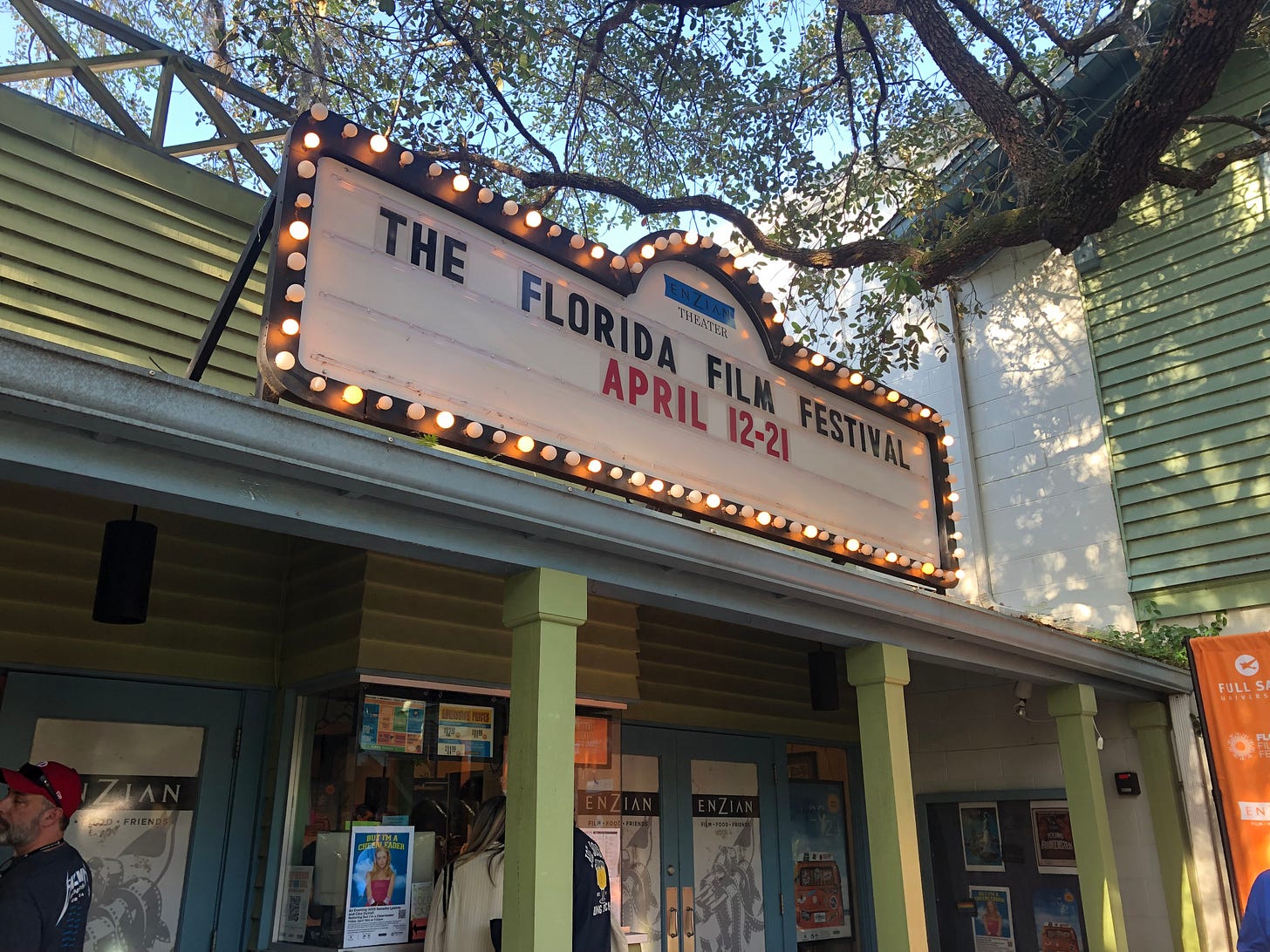

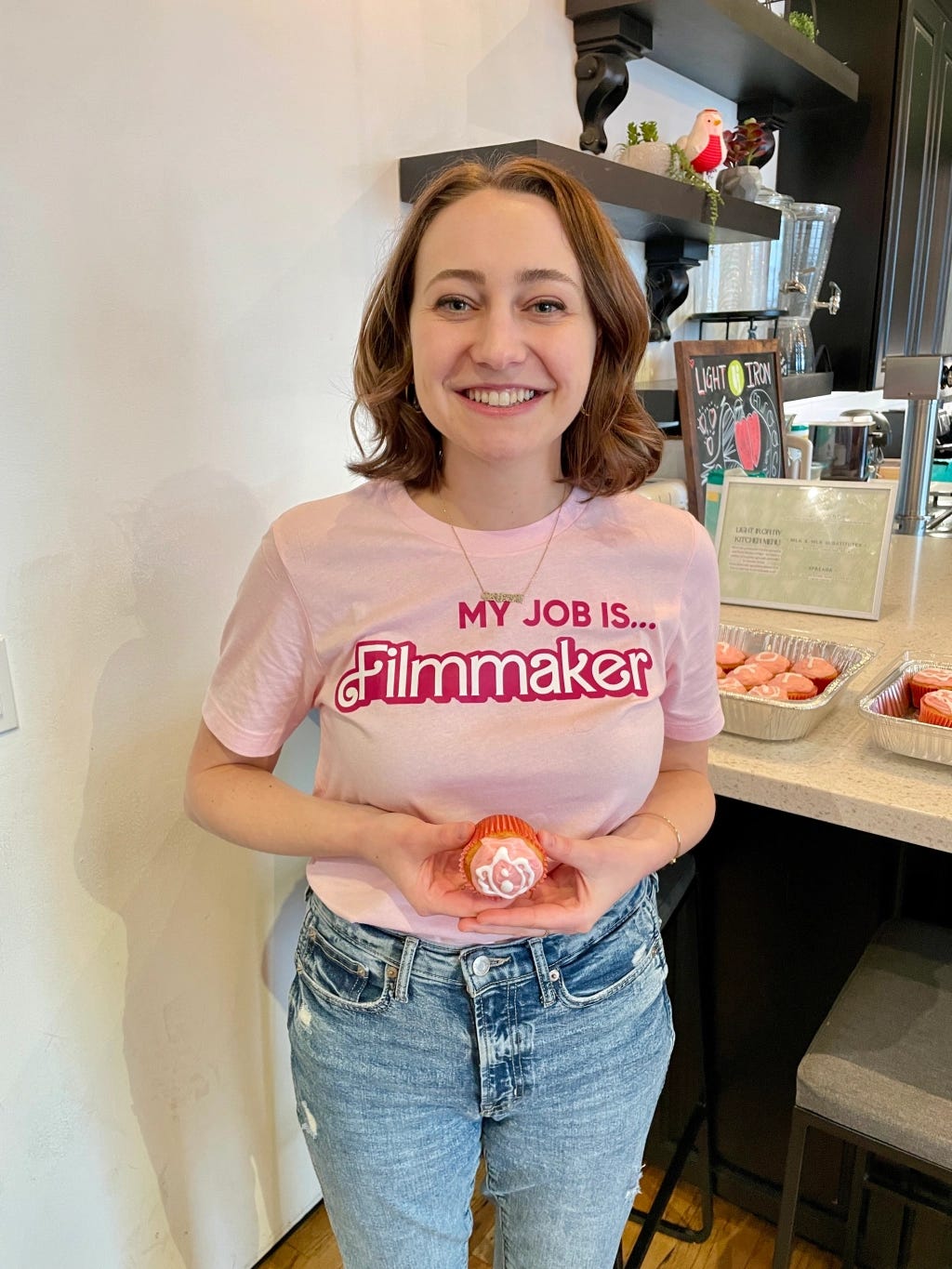
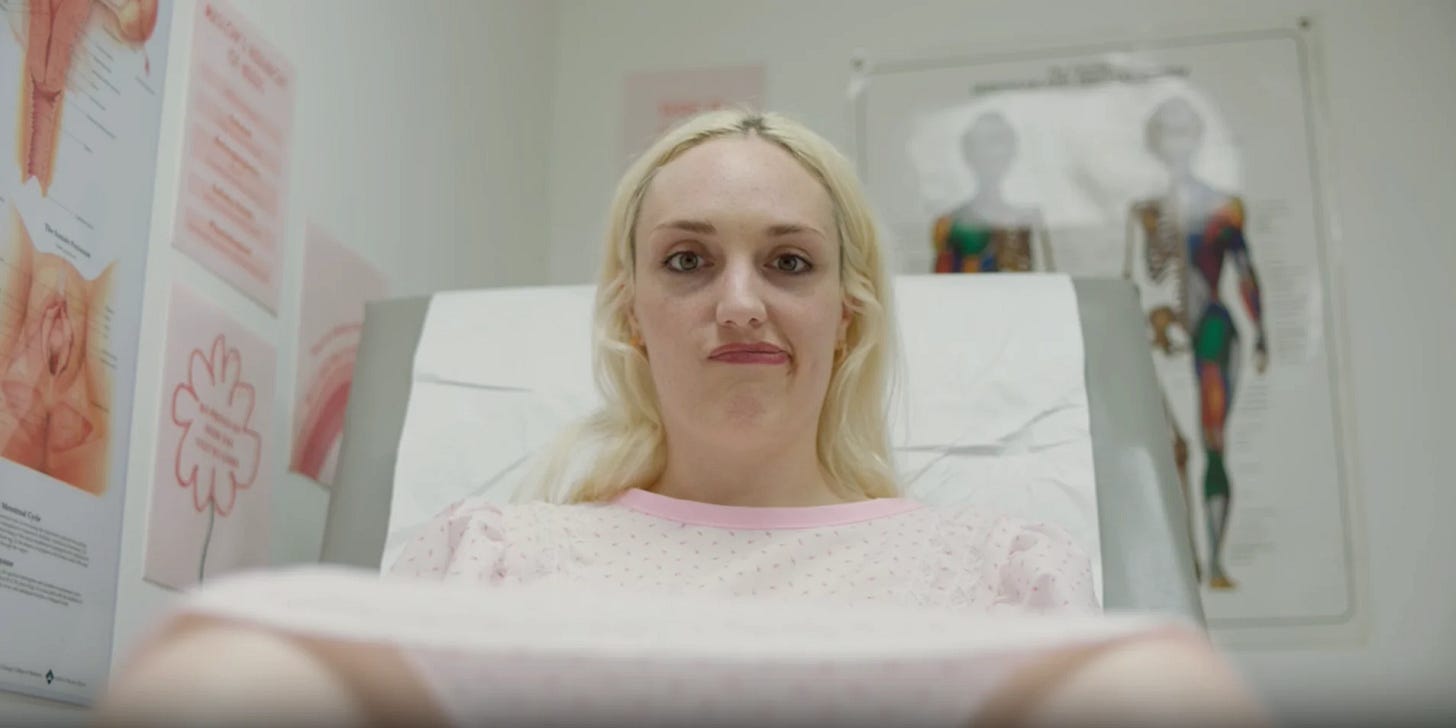

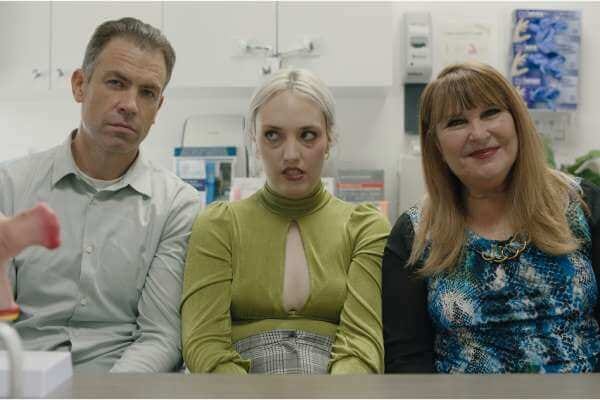
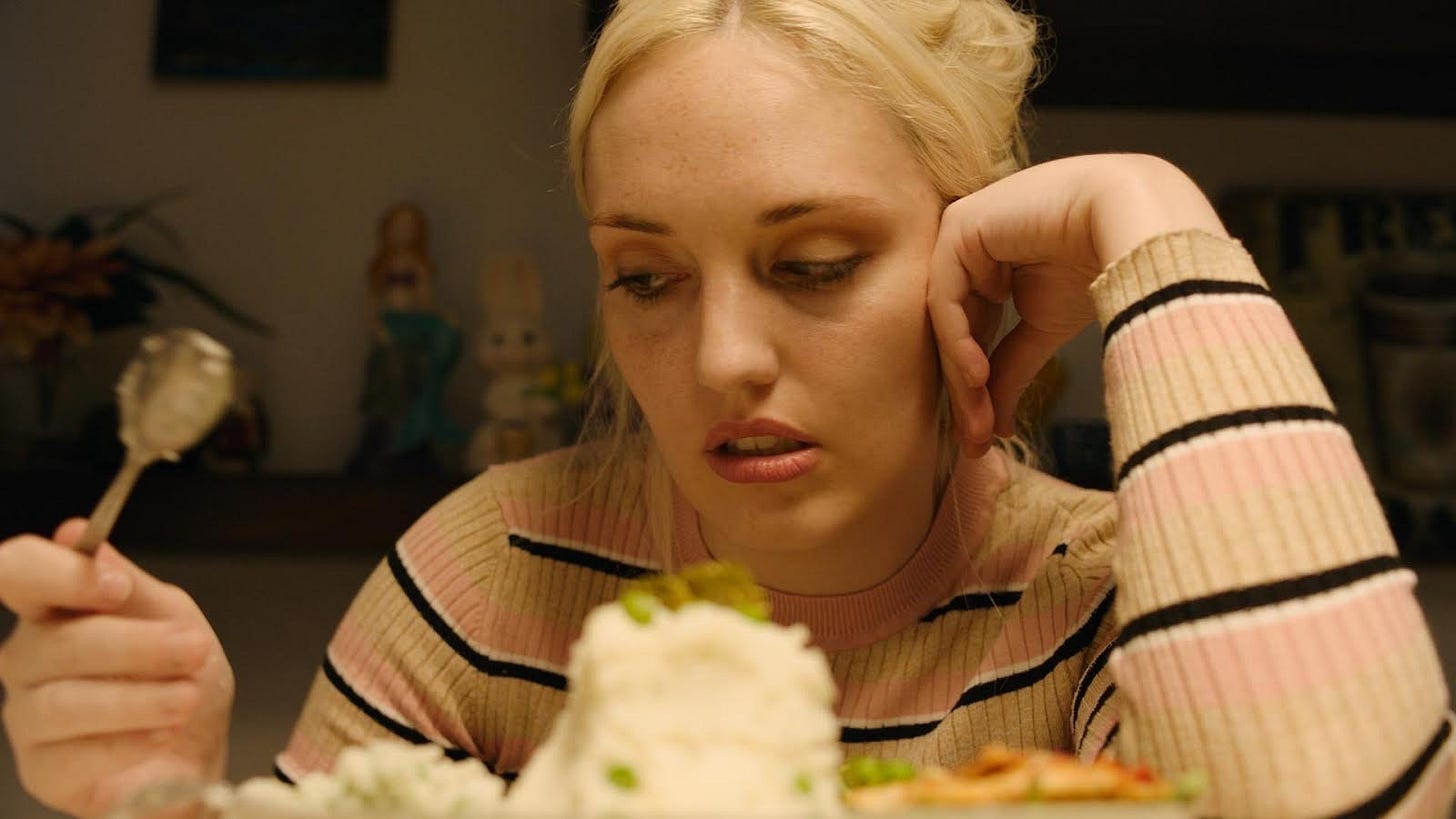
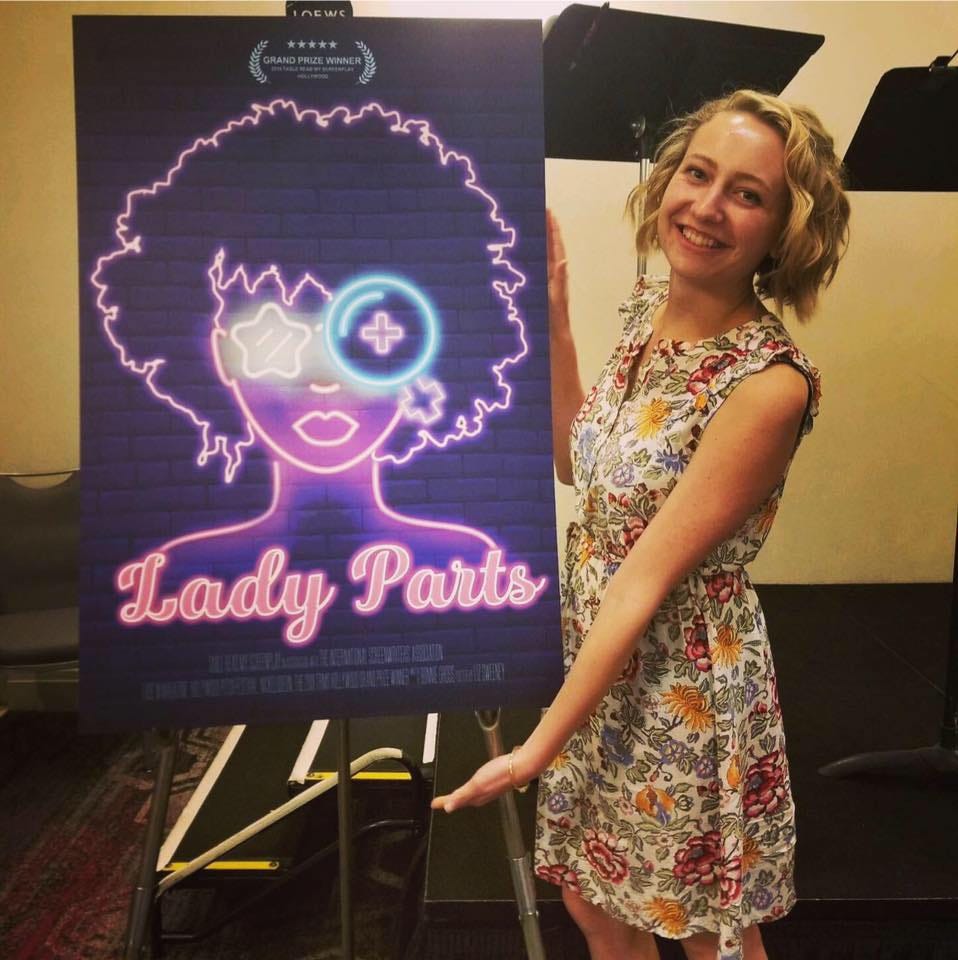
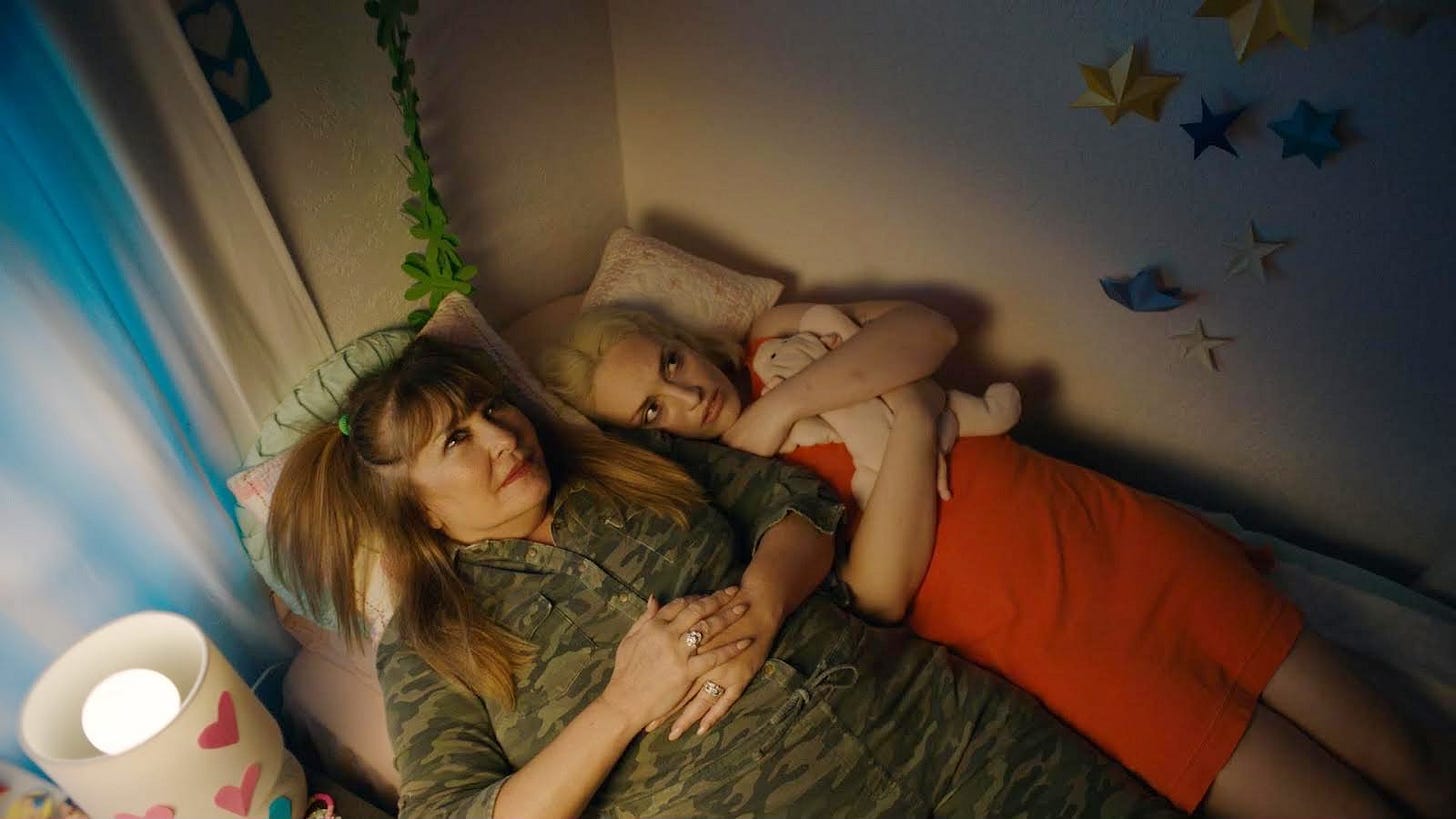
🙏🏻❤️
LOVE this! I cannot wait to share it on The Empress and Gotham Girl! Congrats to Bonnie and all on the team for getting it done!